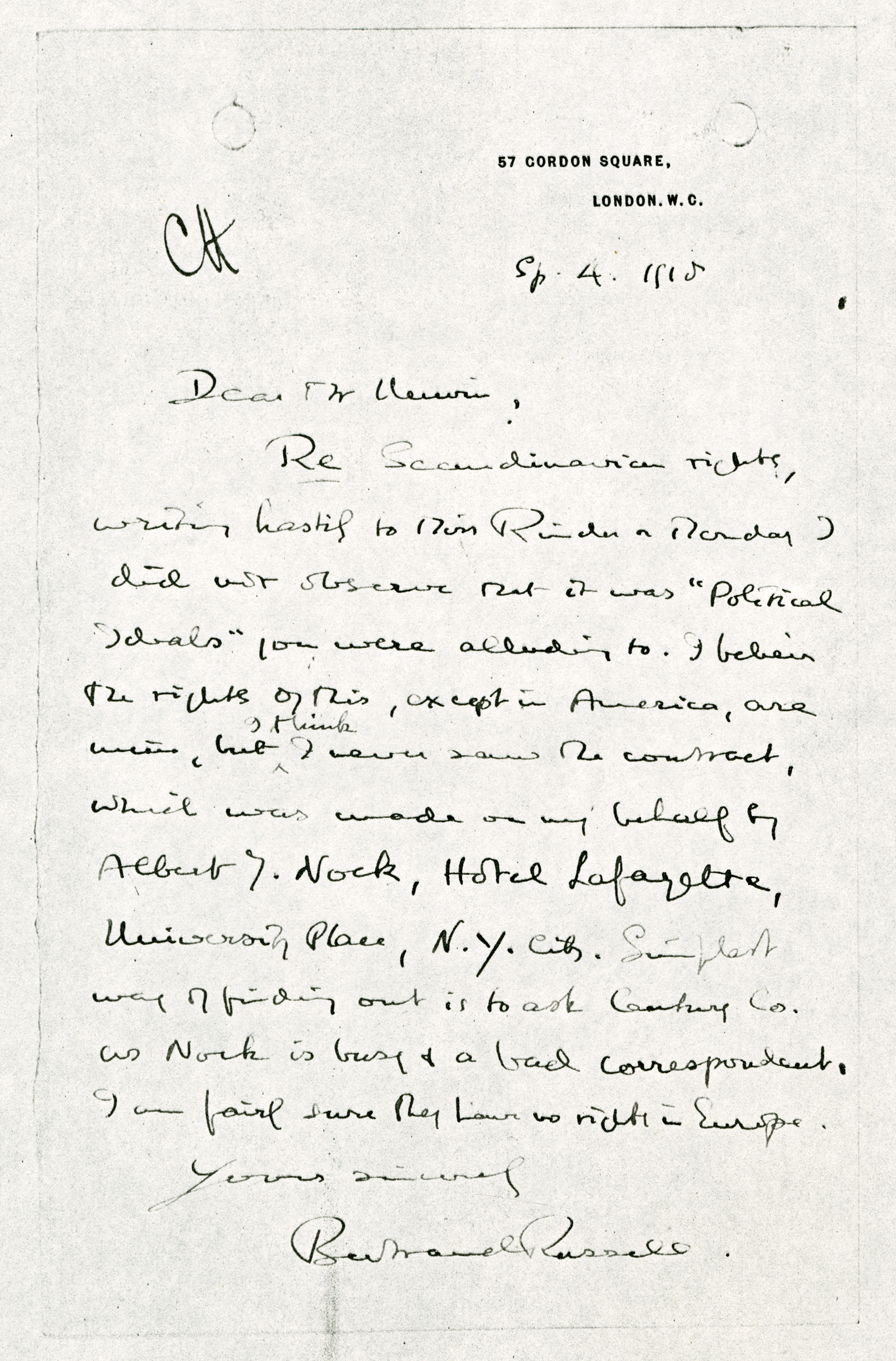Brixton Letter 96
BR to George Allen & Unwin Ltd. / Stanley Unwin
September 4, 1918
- ALS
- Reading
- Edited by
Kenneth Blackwell
Andrew G. Bone
Nicholas Griffin
Sheila Turcon
Cite The Collected Letters of Bertrand Russell, https://russell-letters.mcmaster.ca/brixton-letter-96
BRACERS 47456
<letterhead>
57 GORDON SQUARE,
LONDON, W.C.
<Brixton Prison>1
Sp. 4. 1918
Dear Mr Unwin,
Re Scandinavian rights,2 writing hastily to Miss Rinder on Monday3 I did not observe that it was Political Ideals4 you were alluding to.5 I believe the rights of this, except in America, are mine, but I thinka I never saw the contract, which was made on my behalf by Albert J. Nock,6 Hotel Lafayette, University Place, N. Y. City. Simplest way of finding out is to ask Century Co. as Nock is busy and a bad correspondent. I am fairly sure they have no rights in Europe.
Yours sincerely
Bertrand Russell.
- 1
[document] The letter was edited from a photocopy of the signed original in BR’s hand in the Allen & Unwin archives at the University of Reading. The initials of approval, “CH”, of the Brixton Governor are at the top of the sheet.
- 2
Scandinavian rights See Frank’s letter to Unwin the next day (Letter 98).
- 3
Miss Rinder on Monday The letter alluded to by BR seems not to be extant. The previous extant letter to Rinder is that of 26 August 1918, Letter 84. In it there was a message for Unwin, but the message isn’t in the typescript made from the missing original.
- 4
Political Ideals The book publication of BR’s 1916 lecture series, “The World as It Can Be Made” (see Papers 14: 224 and Pt. VI). No translations prior to 1963 into any Scandinavian languages are known.
- 5
you were alluding to Unwin’s letter about Scandinavian rights is not extant in the Russell Archives.
- 6
contract … made on my behalf by Albert J. Nock Acting as an ad hoc literary agent, Albert Jay Nock (1870–1945), pacifist, writer, educator and publisher, negotiated terms for the Century Company’s publication of Political Ideals in 1917 in the US. He had met BR at a Quaker Conference in London in June 1915. After the war Nock founded The Freeman, a New York political weekly which published a number of BR’s writings in the 1920s — with B.W. Huebsch (see Letter 74) as the paper’s publisher.
Textual Notes
- a
I think Inserted.
57 Gordon Square
The London home of BR’s brother, Frank, 57 Gordon Square is in Bloomsbury. BR lived there, when he was in London, from August 1916 to April 1918, with the exception of January and part of February 1917.
Brixton Prison
Located in southwest London Brixton is the capital’s oldest prison. It opened in 1820 as the Surrey House of Correction for minor offenders of both sexes, but became a women-only convict prison in the 1850s. Brixton was a military prison from 1882 until 1898, after which it served as a “local” prison for male offenders sentenced to two years or less, and as London’s main remand centre for those in custody awaiting trial. The prison could hold up to 800 inmates. Originally under local authority jurisdiction, local prisons were transferred to Home Office control in 1878 in an attempt to establish uniform conditions of confinement. These facilities were distinct from “convict” prisons reserved for more serious or repeat offenders sentenced to longer terms of penal servitude.
George Allen & Unwin Ltd.
George Allen & Unwin Ltd., founded by Stanley Unwin in 1914, was BR’s chief British publisher, had published Principles of Social Reconstruction in 1916, and was in the process of publishing Roads to Freedom (1918) while BR was in Brixton.
Gladys Rinder
W. Gladys Rinder worked for the No-Conscription Fellowship and was “chiefly concerned with details in the treatment of pacifist prisoners” (BR’s note, Auto. 2: 88). More specifically, she helped administer the Conscientious Objectors’ Information Bureau, a joint advisory committee set up in May 1916 and representing two other anti-conscription organizations — the Friends’ Service Committee and Fellowship of Reconciliation — as well as the NCF. One C.O. later testified to her “able and zealous” management of this repository of records on individual C.O.s (see John W. Graham, Conscription and Conscience: a History, 1916–1919 [London: Allen & Unwin, 1922], p. 186). Rinder exhibited similar qualities in assisting with the distribution of BR’s correspondence from prison and in writing him official and smuggled letters. Her role in the NCF changed in June 1918, and after the Armistice she assumed control of a new department dedicated to campaigning for the immediate release of all imprisoned C.O.s. She appears to have lost touch with BR after the war but continued her peace advocacy, which included publishing occasionally on international affairs. In 1924 she travelled to Washington, DC, as part of the British delegation to a congress of the Women’s International League for Peace and Freedom. Decades later Colette remembered Rinder to Kenneth Blackwell as somebody who “seemed about 40 in 1916–18. She was a completely nondescript person, but efficient, and kind” (BRACERS 121687).
Governor of Brixton Prison / Carleton Haynes
Captain Carleton Haynes (1858–1945), the Governor of Brixton Prison in 1918, was a retired army officer and a cousin of BR’s acquaintance, the radical lawyer and author E.S.P. Haynes. In March 1919 BR sent Haynes, in jest, a copy (now in the Russell Archives) of his newly published Introduction to Mathematical Philosophy — so that the governor’s collection of works written by inmates while under his charge would “not ... be incomplete” (BRACERS 123167).
